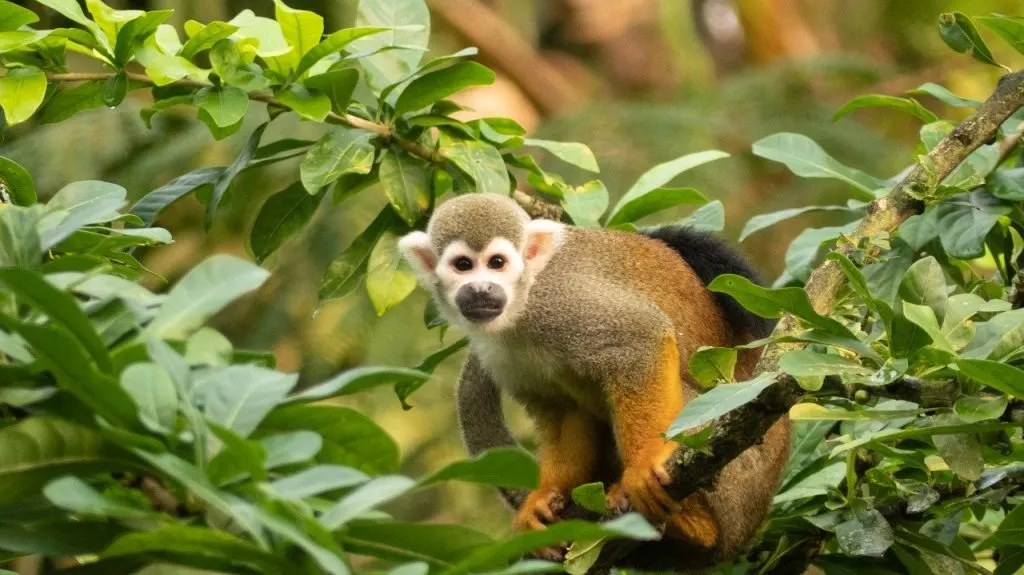Animal lovers always look for ways to turn their houses into real-time zoos. Even though cats and dogs make ideal pets, the fact that everyone owns one has gotten “too boring”.
When talked about the most unusual pets to keep at home, monkeys are among those who land first on the list. The idea of owning a monkey is captivating in a movie or a television show. But is it fun, or is it just exceptional hard work?

Monkeys are lovable animals who will happily learn tricks from you. Moreover, there is no doubt that baby monkeys indeed make our hearts melt.
Alongside all the reasons why monkeys are a must-have, there are some reasons why there are only several households with monkeys as their pet.
With more than 330 species of monkeys available in different regions of the world, some are docile, while the rest cannot be tamed. So, if you are among those who want to go ahead with the idea of petting a monkey, it is essential to consult a veterinary doctor.
| Key Points on Pet Monkeys |
| Keeping a monkey as your pet will be an exciting way to learn about animals. |
| Monkeys prefer staying out in the wild; keeping one at home will be challenging. |
| Before bringing home a monkey, do the necessary tasks to avoid any future hazards. |
| The care required for monkeys is different from a regular cat or a dog. The living conditions, food intake, and vaccinations require special attention. |
| Monkey pet owners must give their pet time and attention so that the fondness and trust between the two remain intact. |
We have gathered a list of species that can be kept at home. It does not mean that the following species require relatively less care than the others; they can be tamed and trained with the right level of care and attention.
Monkey Breeds That You Can Bring Home
When it comes to the domestication of a monkey, note that not all breeds are cut. Only a handful of monkeys can make a good pet; the rest are likely to create an uncertain environment around the house. The ones that make it to the pet list are mentioned below:
#1 Chimpanzee

The first on our list of pet monkeys are chimpanzees. These are relatively calmer monkeys who fall more in the category of apes. Chimpanzees are often the most in number in a zoo as they can adjust to captivity easily.
The average height of a chimpanzee is around 5 feet tall, weighing over 140 pounds. At just the age of 5, these strong animals require a proper healthy diet and special attention.
If treated right and given adequate living conditions, this breed will stay with you for at least 40 years of their lives. It is important to note that chimpanzees have attacked people in the wild, so safety measures must be followed religiously.
#2 Spider Monkey

This monkey breed may be the most adorable breed to look at. Their small size and attractive physical features make you want them at your home immediately.
Spider monkeys may look cute, but their messy nature will put you in a pickle. These do not even enjoy wearing diapers, and potty-training them is impossible without a trained professional.
This breed should only be entertained if you are willing to spend time at home and give them attention since they are very social and interactive.
#3 Squirrel Monkey
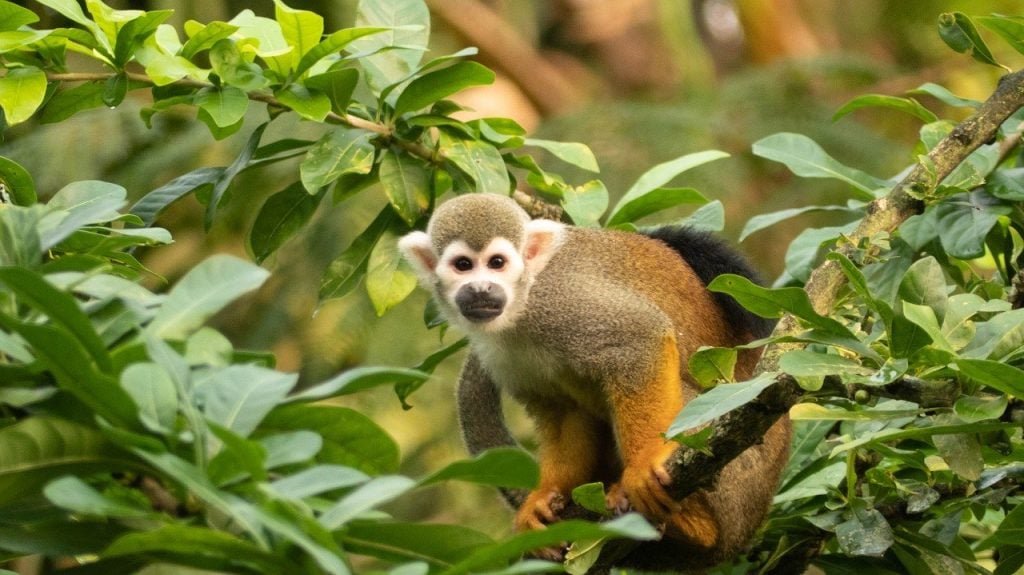
A smaller breed of monkey that can stay captivating is the Squirrel monkey. This species only has a height of around 14 inches and does not weigh more than 2-3 pounds. Their food intake is also moderate.
However, it cannot be ignored that these creatures are very active. They need a lot of space to move around. If you are thinking of keeping them at home, you must make arrangements for tall ladders so they can stay busy.
#4 Capuchin
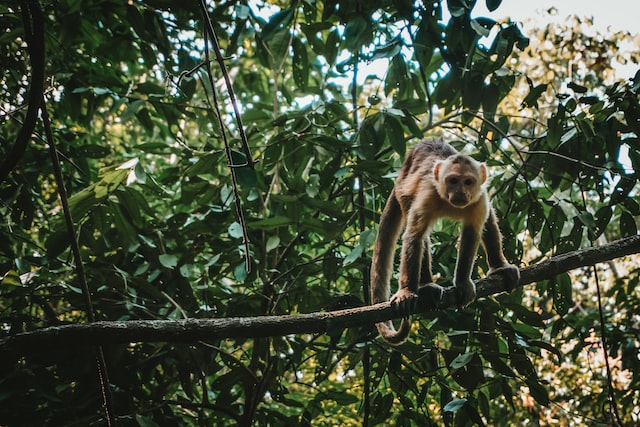
The Capuchin breed is physically a much easier monkey breed to a pet than the other breeds. This is because of their compact size. The maximum height these monkeys will go to is 2 feet.
Households with children wanting to pet a monkey should consider this breed due to its manageable height and weight. Moreover, the lifespan of this breed is not more than 25 years which is half that of a chimpanzee.
#5 Marmoset
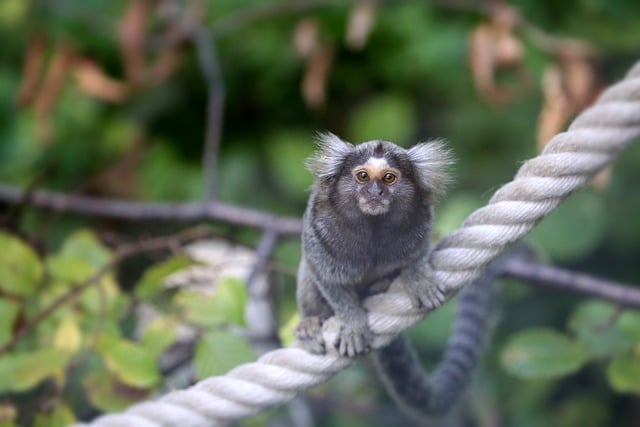
When compared with other breeds, marmosets are the smallest in size. The maximum size they reach is around 9 inches. These small breeds are the loudest among the rest.
Prepare with aggressive yelling and screaming if a marmoset is not pet or fed at its designated time. The lifespan of this breed is around 15-20 years.
Things To Know Before Keeping a Pet Monkey
Keeping a monkey is possible. It is not even illegal, as in most countries. However, as much as the idea of owning monkey intrigues you, note that there are many things that one must prepare for beforehand.
#1 Check If Keeping a Monkey Legal in Your State
As mentioned earlier, keeping a monkey at home may or may not be legal in some countries. Therefore, before you spend a good amount of money on this animal, check whether you are legally permitted to do so.
In countries where keeping a monkey at home is legal, other laws must be considered. Many states require you to have additional permits and regular home inspections.
Moreover, some insurance firms have the right to cancel your terms with them due to the availability of an unlikely pet. Several liability covers have to be paid first. You might also be asked to showcase whether you and your family have all the necessary vaccines and injections.
#2 Management Of Food And Vet Expenses
The next thing you must consider is the amount of money spent on the whole process. Not only do you have to purchase the monkey, but the cost of food visits, the veterinary doctor, regular maintenance, diapers, their cage, etc., cannot be ignored.
Furthermore, the food intake of monkeys will vary with age. There is a high chance that when they hit their mating period, they will want more care and a larger amount of food and medicine. So, several surprises come with the expenses, too, as one cannot allocate any amount.
Small monkey breeds cost around 6500$, while the other species with a broader lifespan can cost up to 70,000$.
#3 Proper Housing Of Monkeys
It is essential to note that monkeys are exotic animals who need space to move around. Since this animal is not likely kept as a pet, you cannot also allow it to roam freely in your backyard as the chances of theft are high.
The house for a monkey should be spacious. Alongside its size, there must be bars and swings for them to exert their energies. The closures must be secure so that they do not escape and there are no human intruders.
If you are considering constructing a cage yourself, you need to use the right strong and stable material. There must be proper ventilation so that the animal does not feel caged.
#4 Toilet Training Is Essential
Most people look forward to getting professional assistance in toilet training their pets. Monkeys tend to stay outdoors, and toilet training them will be a hazard.
Diapers will only work on monkeys when they are small in size and age. Once they age, they will learn how to rip the diapers apart. Several monkeys play with their feces and urine when they find nothing else to do.
#5 Mating Season
All social animals have a span in which they desire a mate. Whether we talk about cats or dogs, the matting season is always crucial. In most cases, the animal’s health comes at stake if not found the proper match to breed.
For monkeys, the chances of you finding the perfect match are tough. Finding the right breed of suitable age will be a task for you.
Failure to locate the right match for your pet monkey to breed will likely get super aggressive.
The Discomforts of Keeping a Pet Monkey
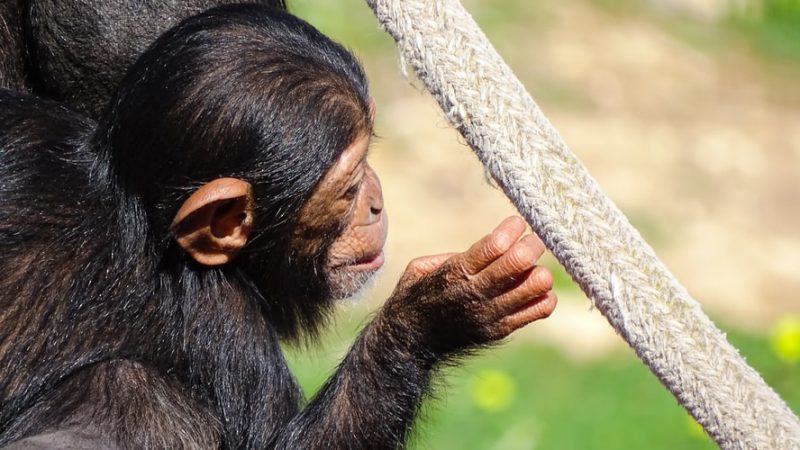
Owning a pet monkey will be more of a liability than enjoyment. The early days might be more accessible when the monkey is young, but once it adapts to your living conditions, it will get super naughty and hard to tame.
You can pet a monkey for over 20 years, and the chances of them being fully trained are very low. The energy spent on their welfare will always be more than your comfort.
Here are some significant issues which do not make monkeys a suitable pet.
Medical Issues
Monkeys tend to catch diseases very quickly. Several zoonotic diseases are spread from monkeys to humans.
God forbid you catch a disease, and the likelihood of finding a veterinarian nearby is low. Not all vets can treat monkey diseases as this animal is not commonly kept at home.
Challenges with Diet
Monkeys are very rigid when it comes to the food they take. You might be wrong if you can barge into any grocery store and collect their food. There is no monkey food readily available in the market either.
Some species only like to eat lizards and spiders. Moreover, some prefer nature-prone foods such as fruits and nuts, which can be hard to find in the city.
If not given adequate food, monkeys end up catching diabetes.
Behavioral Problems
Baby monkeys may be easy to tame, but they start to revolt more once they get older. Young monkeys may listen to you well and adapt to your house. When they get older, the real issue starts to take place.
Monkeys are wild animals and prefer to stay in the wild by nature. By fixating on their natural way, the results are behavioral issues.
The Biting Issue
Every animal studies and inspects things from its mouth first. Therefore, monkeys with 32 sharp teeth are likely to bite too. Due to their curious nature, they will cling and tear off whatever new object they get their hands on.
How To Keep Your Pet Monkey Busy
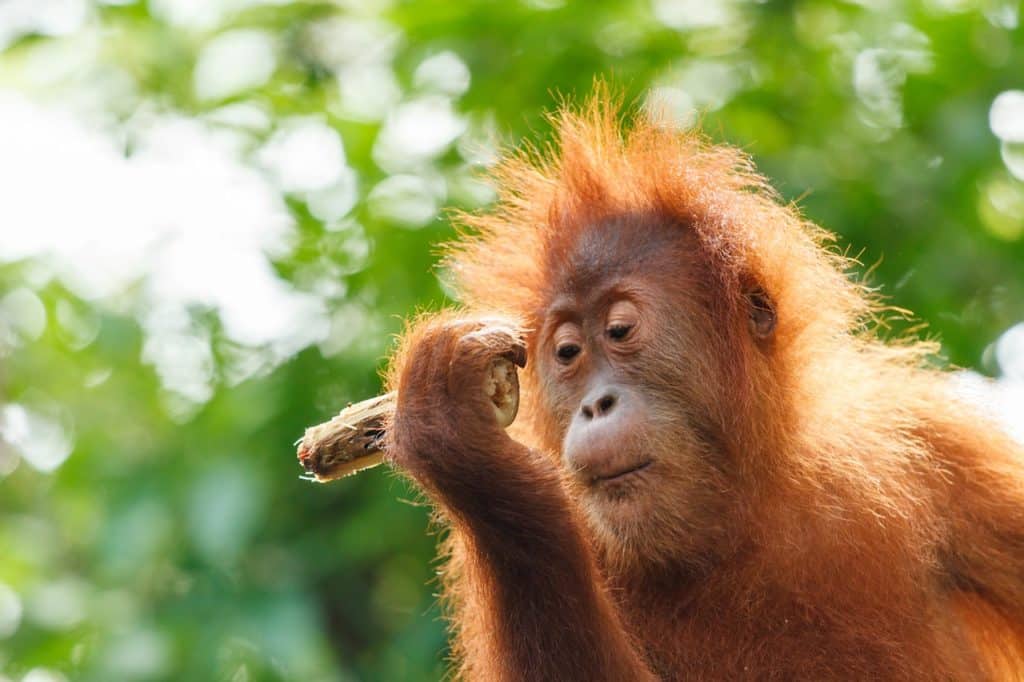
Now that you have decided to bring home a monkey and all the necessary items have been arranged, you need to have some critical points on controlling and petting your monkey.
Unlike keeping a cat, dog, or starfish, monkeys require extra care and ways of interaction.
Since this is a volatile animal not used to staying indoors, here are some key points you need to consider when interacting with your pet monkey.
Find a Veterinarian Nearby
Registering yourself with a veterinarian animal doctor has to be the first in your life. Note that only some doctors will have expert equipment. There is some necessary expertise that avoids the illness and disease exchange between humans and monkeys.
Exotic animals are prone to catching diseases faster than humans. Make sure you’re in contact with the doctor all the time so that nothing mysterious is ignored.
Arrange Interactive Toys
Monkeys are social beings who enjoy playing with toys. Plus, toys will help them get out of their frustration. They will remain less aggressive by entering and probably spare your household items.
Please get stuffed toys that are soft. Remember to get new ones after a month or so, so the animal does not get entirely bored.
Arrange For Snacks
Monkeys should constantly be snacking. This will prevent them from getting angrier when hungry, as that point will not be reached.
Moreover, keeping the snacks inside a box or a container is also good, as the monkey will spend time figuring out how to get the food out. This activity will be playful and will keep the monkey busy.
Interacting With Your Pet Monkey Every Day
Make sure to visit your pet monkey every day to keep their fondness towards you and your family intact. It is essential to develop a bond so that your pet trusts you and listens to you.
If you have one monkey, you must spend a reasonable amount of time with them. If you have more than one, it is ideal to leave the two alone, as monkeys prefer to stay with their kind.
Letting your pet play with strangers is also not recommended. Taking your monkey out in public makes it excellent as long as no one around it is acting strange. People who need to learn more about keeping a monkey can give it unhealthy snacks that might cause illnesses.
Moreover, your monkey might get uncomfortable around strangers and behave in a way you do not know how to control. If by any bad luck, your monkey attacks a stranger, the Animal Control Officer will have the full right to take your pet into custody. Your license to keep a monkey can also be revoked in some areas.
Be Vocal with Your Pet
Since it’s your pet, giving it a name is always the first thing to do. Call out your pet with its name and wait for it to respond. Give it treats when it listens to you. You could play some music in the room so that whenever it is played, the monkey knows you are around and it is playtime.
Be interactive with your monkey too. It is always a good idea to dance and hop around your pet so they get physically comfortable with your presence. Remember to treat your pet with its favorite snacks so that good behavior is set.
Be As Calm As You Can
Before you get a pet monkey, note that it is vital to understand that monkeys will not be tamed. They are naturally aggressive, so you need to be calm and not expect quick results with your training.
With age, the behavior of your pet monkey will also change. If you shout or hit the monkey, it will not trust you better, and all the training effects will be lost.
If your pet monkey is acting strangely, first check whether it is not ill. Check if the sleep schedule and the living parameters are met.
In A Nutshell: Pet Monkey
Yes, keeping a pet monkey will be outside the box. Yes, it will give you a new experience and a lot of stories to tell your friends and family. But are you ready to spend this much time, attention, and cost? If you are, then go ahead!
Keeping a monkey is possible. You have to make yourself available for many factors, which cannot be solved with money. People with long jobs or parents with children who are already running against time are not recommended to own a pet monkey.
Keeping a pet monkey will indeed be an overwhelming experience in your life. It will teach you a list of things you cannot master elsewhere. So, Good luck!
If you like to read more about monkeys have a look at our primate article.
Join our Forum for free today!

- These are The 5 Largest Great White Sharks Ever Recorded - July 19, 2024
- The Surprising Benefits of Big Game Hunting - July 18, 2024
- $100k+ Hunting Experiences The Most Expensive Animals to Pursue - July 17, 2024

